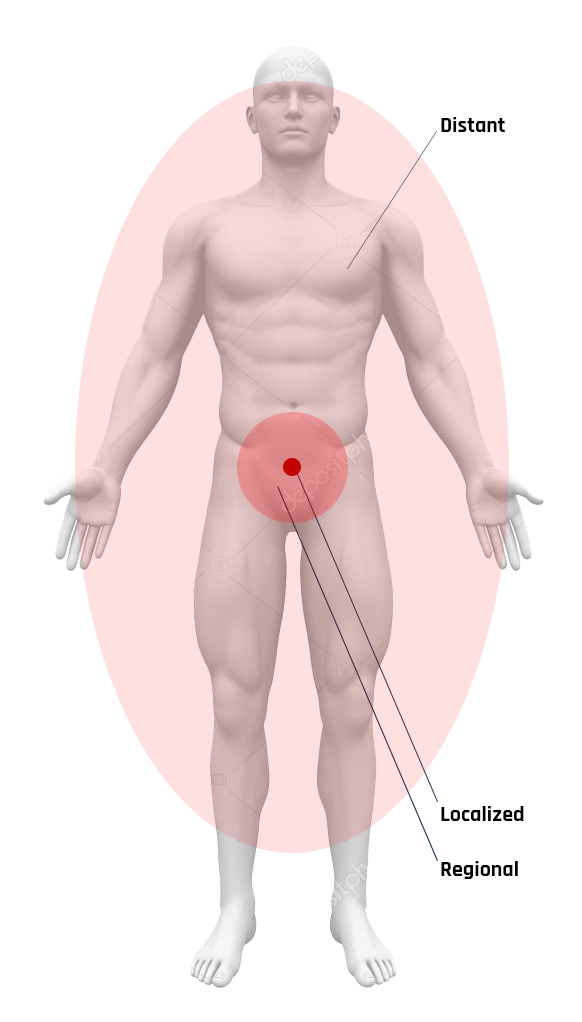Patients and Care Givers | Types of Cancer | Prostate | Screening & Diagnosis
Screening & Diagnosis
Screening for prostate cancer is the act of looking for prostate cancer. The goal of screening, or testing, is to identify cancers that may be at high risk of spreading if not treated or to find the cancer before it spreads or causes symptoms. When it comes to prostate cancer, early detection is vital.
All men are at risk for prostate cancer. When caught early in most cases, it’s a highly survivable disease."
Jonathan Chance
There is a prevailing notion that you will die from something other than prostate cancer … that you may die with it, but you won’t die from it. That is a hurdle to overcome. It can go somewhere else and get in your bones and lungs. It’s the biggest misunderstanding. You may die. Get it checked out. Get it treated."
Amos Tingle

All men are at risk for prostate cancer. When caught early in most cases, it’s a highly survivable disease."
Jonathan Chance
There is a prevailing notion that you will die from something other than prostate cancer … that you may die with it, but you won’t die from it. That is a hurdle to overcome. It can go somewhere else and get in your bones and lungs. It’s the biggest misunderstanding. You may die. Get it checked out. Get it treated."
Amos Tingle
SEER Cancer Stages:
The American Cancer Society estimates that the 5-year relative survival rate for prostate cancer patients on average is greater than 90%.1

| SEER Cancer Stage | 5 Year Relative Survival Rate |
|---|---|
| Localized | >99% |
| Regional | >99% |
| Distant | 34% |
| All SEER Stages Combined | 97% |
These numbers are based on men diagnosed with prostate cancer between 2011 and 2017.
The cancer is confined to the prostate. There is no sign that the cancer has spread outside the prostate. Many physicians further break down localized cancer by risk (low, favorable intermediate, unfavorable intermediate, and high).
The cancer has spread outside the prostate to nearby tissues and organs.
The cancer has spread to other parts of the body away from the prostate, such as the lungs, liver, or bones.
Get tested. Early diagnosis … If you get (prostate cancer), get (treatment) early. Get the best treatment you can get. Do what you can to extend your life. You’re more valuable here than in the cemetery six feet under."
Amos Tingle
Not only is survivorship higher but, depending on the type of treatment and success rate, many patients quickly return to the same activities and lifestyle during and well beyond treatment. If you were diagnosed with prostate cancer, ask your doctor about the types of treatment options, side effects, and additional specialists who can provide more treatment information before deciding which treatment option is best for your health and lifestyle.
My oncologists were so thorough. They took their time discussing everything. I felt very confident with the treatment plan and in my providers. Deciding on a treatment plan did not take long at all. I had a treatment plan within a month."
David Mitchell
I would have gotten annual PSA test … and kept track of my PSA numbers ... If we had caught my cancer in the early stages, the treatments and everything I went through would have been less aggressive."
Jonathan Chance
Patients treated with our brachytherapy seeds
When is the right time to get screened?
The American Cancer Society (ACS) provides recommendations on prostate cancer screening for certain men2. Before screening, men should consult with their doctor about the benefits and harms of prostate cancer screening, other tests, and treatment.
Read about the men for whom the ACS screening recommendations apply :
Men aged 50 years old
50 years old +
Men at least 45 years old
45 years old +
Men at least 40 years old
40 years old +
For African American men, those with a family history of prostate cancer, and men with other medical conditions that may impact prostate cancer treatment, consider talking to your doctor about your screening frequency and method.
What screening tests are available?
The two most commonly used screening methods are a Prostate Specific Antigen (PSA) Test and a Digital Rectal Exam (DRE). A DRE can often be used together with a PSA screening to distinguish between prostate cancer and non-cancerous conditions.
PSA
Prostate-specific antigen, or PSA, is a protein produced by cells of the prostate gland. The PSA test (a simple blood draw) measures the level of PSA in a man’s blood and elevated PSA levels often indicate the presence of prostate cancer. PSA levels, however, may also be elevated due to other non-cancerous (benign) conditions that affect the prostate.
Get your PSA checked regularly. Everyone must be an advocate for your care"
David Mitchell
Women talk openly about breast cancer and they will gladly tell you about the importance of getting a mammogram. That’s where men need to be ... It’s something we should talk openly about and make getting a PSA test for prostate cancer just as common as getting a mammogram is for breast cancer."
Jonathan Chance
I have several friends and golfing buddies who have all said make sure you get your PSA checked out … Every year on a lake trip with my Navy friends, we encourage other men to see their doctor and get their PSA test"
Amos Tingle
DRE
A digital rectal exam (DRE) is performed by a physician who inserts a gloved, lubricated finger into the rectum. The purpose of the exam is to feel for any irregularities in size, shape, and texture of the prostate.
The earlier cancer is detected and treated, the higher the survival rate.

Find a Physician
Related pages
Proud Supporters of Movember:







Together, we can make a difference for men’s health.
Help support us by visiting our THERA STACHE fundraing page:
Connect with Us
Stay connected.
Join our Life after Seeds Facebook Group
